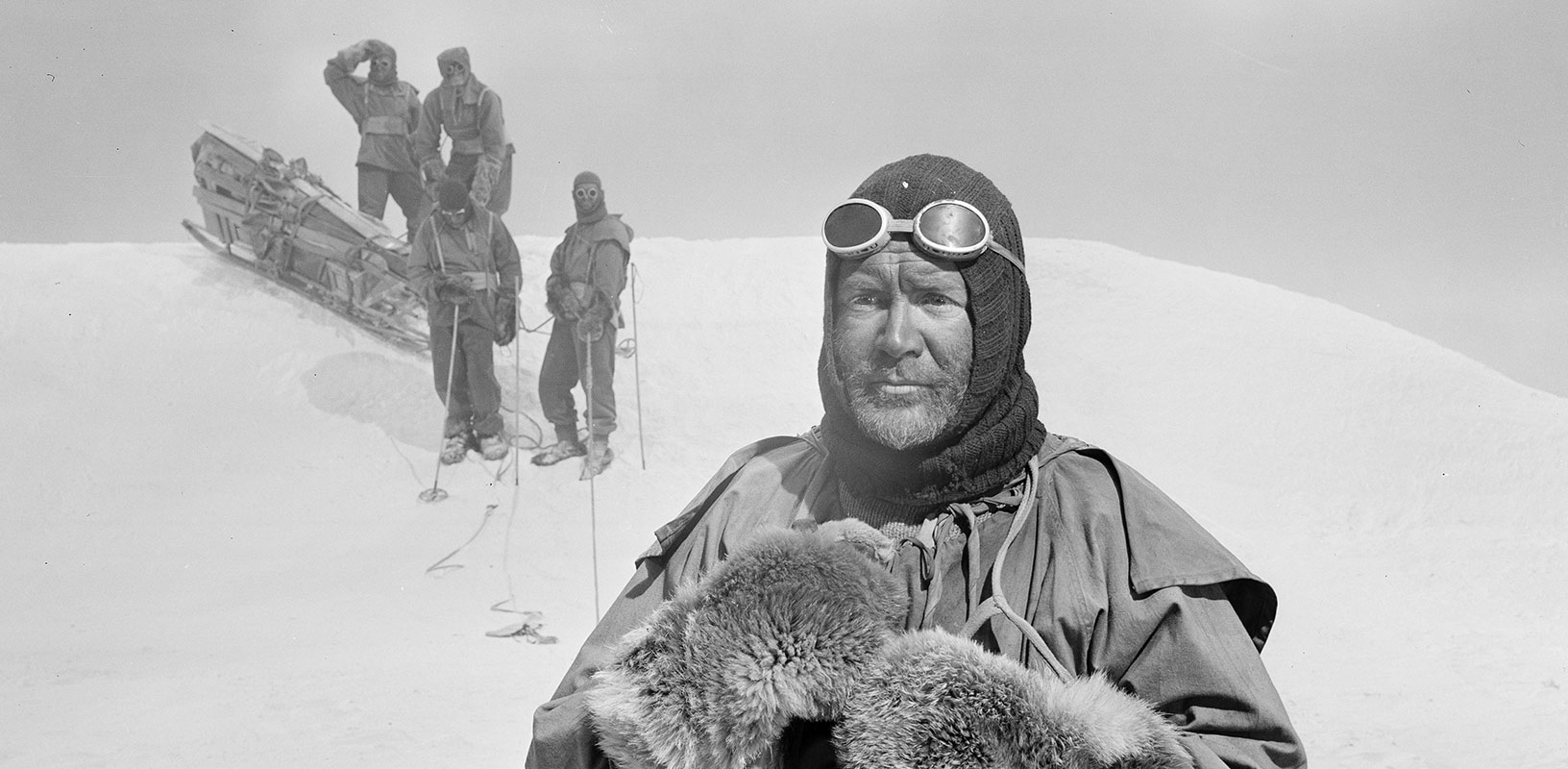Ralph Vaughan Williams: music for Scott of the Antarctic

The 150th anniversary of the birth of Ralph Vaughan Williams on 12 October 2022 offers opportunities to explore the remarkable music he wrote for the film Scott of the Antarctic: the composer’s full original score is now available, the edited film version can be screened with live orchestra, while his Sinfonia Antartica can be programmed in concert series celebrating the anniversary.
The music of Ralph Vaughan Williams published by Oxford University Press is promoted here under license by Boosey & Hawkes.
The film Scott of the Antarctic was produced by Ealing Studios and released in 1948. It tells the story of Robert Falcon Scott’s ill-fated second expedition to the Antarctic in 1910-13. The film is well known for its score by Ralph Vaughan Williams, which was later reworked to create Sinfonia Antartica, his seventh symphony.
Scott of the Antarctic: complete film music
Vaughan Williams’s original score for the film was heavily edited in the studio and halved in length in order to create the final edit. It is now presented by Oxford University Press in its full 80-minute form thanks to the researches and recent edition by Martin Yates, allowing listeners in the concert hall to hear the full grandeur of the composer’s original composition for the first time. The first complete recording was released in 2017 on the Dutton Epoch label, with the Royal Scottish National Orchestra conducted by Martin Yates.
Simon Wright of OUP notes that “Vaughan Williams composed substantially more material for Scott than was eventually used (music for twenty-eight sequences in all). He had conceived much of the music before he even saw the screenplay, or rushes of the film. When he knew that he was to be the composer he read around the subject as widely as he could, and already had firmly in mind the materials that he would use. The manuscript, now in the British Library, shows the evocative titles for the various scenes: “Heroism,” “Ice floes,” “Penguins,” “Pony march and blizzard,” “Amundsen’s flag at the Pole,” “Death of Oates,” “Only 11 miles.” The subject matter chimed with themes which ran through Vaughan Williams’s whole life’s work, particularly his notion of a man within a pilgrim’s progress, a life-long spiritual quest for redemption and glory through trial and adversity.”
Scott of the Antarctic: film with live orchestra
As a special audio-visual event the Composer’s Cut of Scott of the Antarctic, comprising the 42-minutes of music edited down for the soundtrack, can be performed by live orchestra in sync with the 110-minute film. The OUP materials also include a specially created 10-minute overture of previously unheard music written for the film, drawn from the complete unedited score. Scott of the Antarctic is one of the finest British films of the 1940s. Starring Sir John Mills as the great explorer Captain Scott, and with a supporting cast including Derek Bond, James Robertson Justice and Kenneth More, the film tells the story of Scott’s doomed attempt in 1912 to be the first to reach the South Pole. Accompanying the epic, heroic and ultimately tragic action is the extraordinary music of Ralph Vaughan Williams, a landmark in British film music.
Big Screen Live, in association with Studio Canal and OUP, are proud to present the first performances of Vaughan Williams’s original score played live in synch with the film, a hugely significant moment in the continued appreciation of the composer’s work as we approach the 150th anniversary of his birth in 2022. For more information and to request a technical rider, please contact Tommy Pearson of Big Screen Live on [email protected].
Sinfonia Antartica (Symphony No.7)
The familiar reworked symphonic version, Sinfonia Antartica, was created by Vaughan Williams in 1952, five years after his film score. Scored for soprano solo, SSA chorus and orchestra, the symphony skilfully evokes the sparse beauty and grandeur of the landscape with a large orchestra and percussion section, including – famously – a wind machine, to create a work of great power and intensity.
Simon Wright of OUP notes: “The five movement form given by Vaughan Williams to his symphony imposes a musical architecture on material which originated in the sectional narrative and mood painting inherent in film music. The symphony is not a patchwork sewn together from the film score, but a re-ordering and in many cases re-composition of the original material. The composer’s philosophical and objective intent is underlined by his inclusion of poetic superscriptions to each of the movements (printed in the score, but not recited in performance). A quotation from Scott’s journals (“I do not regret this journey… We took risks, we knew we took them; things have come out against us, and therefore we have no cause for complaint.”) replaced a quote from Ecclesiasticus (“Their bodies are buried in peace, but their name liveth for ever more”) for the final movement at the time of publication. The result is a gigantic (forty minute) reflection on man’s isolation and ultimate vulnerability within the extreme untamed wilderness.”
Other scores ripe for discovery during the anniversary celebrations include the Fat Knight Suite drawn from Vaughan Williams’s opera Sir John in Love, the symphonic fantasy A Road All Paved with Stars based on themes from the opera The Poisoned Kiss, a new chamber orchestra edition of his Four Last Songs for mezzo or baritone with orchestration by Anthony Payne, and Norfolk Rhapsody No.2 perfect for pairing with the famous First Rhapsody.
Recent additions to the catalogue include Vaughan Williams’s Shakespearian opera Sir John in Love in a comprehensive new edition by David Lloyd-Jones, drawing on all available sources and providing an authoritative full score with critical commentary, and David Childs’s new arrangement of the ever-popular Tuba Concerto for tenor tuba or euphonium.
> For full information view Oxford University Press’s brochure
> Listen to orchestral music by Vaughan Williams on OUP's Spotify playlist
Photo courtesy of Studio Canal ©
